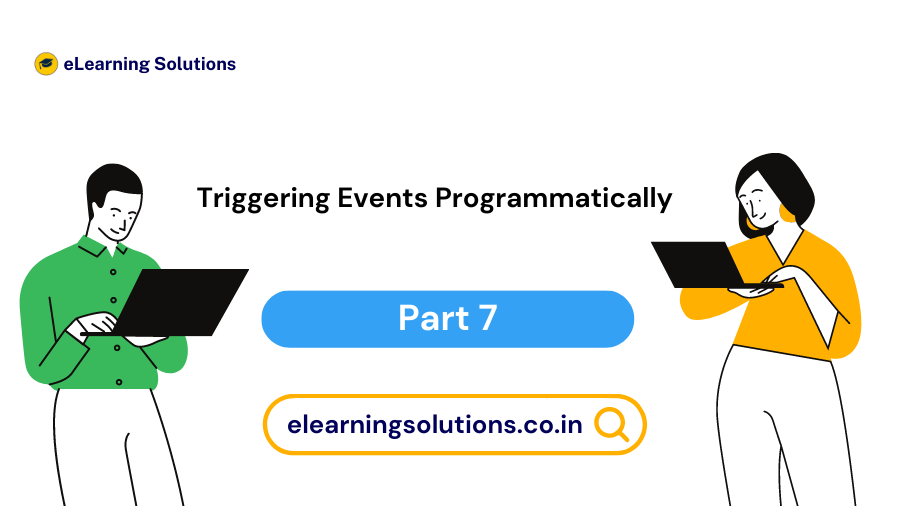1. Introduction: Harnessing the Power of Event Triggers
In the world of software development and automation, event plays a crucial role in driving actions and workflows. Traditionally, event is triggered by user interactions or predefined conditions. However, with the advent of programmatically triggered event, developers and automation enthusiasts can take control and initiate events through code. In this article, we will explore the concept of Triggering Event programmatically, its benefits, implementation guidelines, and use cases.
2. Understanding Programmatically Triggering Event
Automatically set off occasions allude to the capacity to start occasions or activities through code. Rather than depending exclusively on client collaborations or predefined conditions, designers can compose code that expressly sets off unambiguous occasions in light of custom rationale, framework occasions, or outside factors. This degree of control considers more prominent adaptability and mechanization prospects in programming applications and work processes.
3. Benefits of Programmatically Triggering Event
Programmatically triggering events offers several benefits:
-
- Flexibility and customization: With programmatically triggered events, developers have the freedom to define event triggers based on specific requirements, business logic, or system events.
-
- Automation and efficiency: By automating event triggering through code, repetitive tasks can be streamlined and executed without manual intervention, saving time and effort.
-
- Integration and interoperability: Programmatically triggered events facilitate seamless integration with other systems, allowing for real-time data synchronization, communication between applications, and streamlined workflows.
-
- Advanced workflow orchestration: Programmatically triggering events enables sophisticated workflow orchestration by allowing actions to be initiated based on complex conditions, calculations, or external data sources.
4. Step-by-Step Guide to Triggering Event Programmatically
Here is a step-by-step guide to help you trigger incidents programmatically:
1.Recognize the occasion: Decide the particular occasion you need to set off automatically. It very well may be a framework occurrences, client activity, or a custom episodes in view of your application’s necessities.
2. Characterize the trigger circumstances: Recognize the circumstances or models that should be met for the episodes to be set off. This could include information approvals, time sensitive triggers, or outer triggers from different frameworks or APIs.
3.Compose the code: Utilizing your preferred programming language or structure, compose the code that incorporates the rationale to check the trigger circumstances and start the episodes when the circumstances are met.
4.Coordinate the code: Integrate the code into your application or work process where the occasion should be set off. This could include connecting the code to client collaborations, framework episodes, or planned positions.
5.Test and refine: Completely test the usefulness of the automatically set off episodes and make any essential changes or refinements in view of testing results and client criticism.
5. Use Cases for Programmatically Triggering Event
Programmatically triggered incidents find applications in various scenarios, including:
-
- Real-time notifications: Triggering event programmatically allows for instant notifications to users or stakeholders based on specific conditions or system incidents.
-
- Data synchronization: By initiating incidents programmatically, you can keep data synchronized across different systems or databases in real-time.
-
- Workflow automation: Programmatically triggered event can automate complex workflows by initiating specific actions based on custom logic, time-based triggers, or external incidents.
-
- Integration with external systems: Programmatically triggering evens enables seamless integration with external systems, APIs, or services, allowing for efficient data exchange and communication.
6. Best Practices for Implementing Programmatically Triggered incidents
To ensure effective implementation of programmatically triggered incidents, consider the following best practices:
1.Plan and characterize prerequisites: Obviously characterize the necessities and conditions for setting off episodes automatically, taking into account both the business rationale and client assumptions.
2.Keep coding guidelines: Comply to coding principles and best practices while composing the code that triggers occasion automatically. This guarantees viability, lucidness, and consistency in the codebase.
3.Execute blunder taking care of: Record for possible mistakes or exemptions that might happen during occurrences setting off and carry out proper mistake dealing with instruments to effortlessly deal with them.
4.Screen and advance: Ceaselessly screen and enhance the exhibition and proficiency of the automatically set off occurrences. Consistently audit the occurrences triggers, conditions, and code to guarantee ideal usefulness.
7. Conclusion
Automatically Triggering Event engages designers and computerization lovers to assume command over occasion driven activities through code. By starting occasion automatically, applications and work processes gain adaptability, robotization capacities, and consistent combination with outside frameworks. Utilizing this approach takes into account progressed work process arrangement, ongoing notices, and effective information synchronization. While executed following prescribed procedures, automatically set off occurrences can essentially improve the usefulness and proficiency of programming applications.
FAQs
1. Can I programmatically trigger events in any programming language?
Yes, you can programmatically trigger incidents in most programming languages. The availability of specific libraries, frameworks, or event-driven architectures may vary, but the concept of programmatically triggering event is applicable across different languages.
2. Are there any performance considerations when triggering incidents programmatically?
When triggering event programmatically, consider the performance implications, especially if the event involve resource-intensive actions or external integrations. Optimize your code and monitor the incidents triggering process to ensure efficient execution.
3. Can programmatically triggered incidents be undone or canceled?
The capacity to fix or drop automatically set off episodes relies upon the plan and execution of the application or work process. It is essential to consider the rollback or wiping out instruments while planning occasion setting off frameworks.
4. Are there security considerations when programmatically triggering incidents?
Security is a crucial aspect to consider when programmatically triggering event, especially when it involves sensitive data or critical actions. Implement proper authentication, authorization, and validation mechanisms to prevent unauthorized triggering of incidents.
Interested in this SAP Classes ? Fill Your Details Here




 WhatsApp us
WhatsApp us